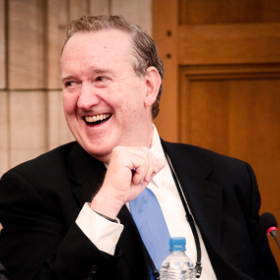
The Genesis of EWI
The EastWest Institute was born in the East. It was begun over a beer in a Chinese restaurant with a modest proposal from Co-Founder Ira Wallach.
"If you could do anything to make the world a safer place for my grandchildren, John, what would you do?" At the time of this unexpected conversation in 1981, the realities of a deepening Cold War had set in and the possibility of ending the Cold War was amongst the most distant of dreams. The détente period was slowing down and the rhetoric on both sides was heating up. The Third World was a frequent battlefield for the two superpowers and new instabilities from Afghanistan to Mozambique were dangerously destabilizing the East-West balance of power. Other forces, both sectarian and nationalistic, were appearing to endanger the peace. In Iran, the revolutionary turmoil of 1979 encouraged the ruinous Iraqi invasion. Lebanon was engulfed in violence, and Beirut was one of the most infamous of cities on earth.
Life in Lebanon in the early 1980s was not for the weak at heart. Incoming phone calls could generate deadly explosions and casual drives down winding dirt roads turned into fatal ambushes. The bullets of professional assassins killed their targets, and stray bullets killed at random. To John Edwin Mroz, a young scholar who devoted much of his time to the Middle East working on UN peacekeeping and peacebuilding efforts, the horrors of Lebanon provided an urgent sense of mission, and this adversity forged the character of EWI.
A headline in a newspaper in Ceaucescu's Romania posed the theoretical question, "Who are You Really, John Mroz?" The inference was that he was an agent of a neighboring country. Mistrustful minds for years have sought to understand the "real agenda" behind the EastWest Institute. During the course of countless interviews in Europe and the U.S., John Mroz and EWI were labeled "Polish partisans," "Hungarian nationalists," or supporters of other nationalities that the speaker viewed as opponents. Some questioned whether John and EWI were agents of the U.S. government or a furtive subordinate of the USSR. It seemed impossible that a group of European and American citizens could come together and set out to build confidence and promote fundamental change.
What lies behind the "real motives" of EWI however, can be found in the tragic cityscape of war-torn Lebanon. Here the ambitions and aspirations of the EastWest Institute were ultimately forged. Of the wide range of potential responses to this human tragedy, the Institute conceived by John Mroz and Ira Wallach that day in Amman was born on the road less traveled. A decision was made soon after that afternoon in Jordan to engage the struggle directly, fighting back for peace and to give a chance for the people and nations in the region to know freedom and prosperity. This has set the agenda of EWI, and after 30 years of working in a world in transformation, this cause remains as sacred today as when the Institute was born.

